In the world of commerce, the importance of location cannot be overstated; the place from which you operate is crucial to your success. Whether your business is on the cusp of expanding, relocating, or setting up shop for the first time, the warehouse space you choose can be the critical component that ensures your business runs smoothly or the source of countless problems for you and your employees. The quest for finding rentable warehouse space can be both exhilarating and exhausting, precisely because of the potential challenges and opportunities the space can bring in the future. This is why it is important to have at least some idea about what you’re looking for, even before you start your search. That being said, it is unlikely that you will find warehouse space that ticks all your boxes, you need to figure out which of your warehouse space requirements are a must for your business, and which ones are negotiable.

Preparing for Credit Consideration
Before you embark on the journey of securing the ideal warehouse space for your business, it’s crucial to understand the role credit plays in the leasing process. Landlords and property management companies often conduct credit assessments to assess the financial stability and responsibility of potential tenants. This is understandable, considering leases are often signed to no less than 3 years, which means a significant financial commitment, for both parties.
If your business is not new and has an established financial track record, you should have all the documentation necessary (such as leasing history and financial statements) to convince the landlord that you will be able to honor your obligations.
If your business is new, the landlord will need to check your credit score. If they are satisfied with your credit score, great, but even if they aren’t, it doesn’t necessarily mean the end of the road. Here are some things you can do to reassure your potential landlord about your and your business’s financial responsibility:
2. Referrals and References:
Provide references from previous landlords or business associates who can vouch for your financial responsibility and reliability.
3. Offer a Larger Security Deposit:
This can act as a financial cushion for the landlord in case of any issues during the lease.
4. Collateral or Assets:
If your business has valuable assets or collateral, you might be able to use these as security, which can alleviate credit concerns.
5. Negotiate Lease Terms:
This might include a shorter lease term initially to prove your business’s reliability or flexible lease options that allow for adjustments as your business grows.
While you can certainly navigate these negotiations, as well as the whole process, on your own, it’s worth considering that experienced commercial real estate brokers have an insider’s understanding of these subtleties.

Hiring a Commercial Real Estate Broker
Hiring a commercial real estate broker might pose a challenging decision for some business owners. Among the most prevalent reasons for this hesitancy are the desire to have full control over the process of finding warehouse space and the concern about potential additional costs associated with hiring a broker.
While the wish for autonomy is understandable, it’s crucial to recognize the number of benefits a knowledgeable broker can bring to the table, including their expert insights, negotiation prowess, and in-depth understanding of the local real estate market. When looking for a commercial real estate broker to guide you on how to find warehouse space, you should focus on the following:
- Clear Communication and Transparency: Find a broker who communicates clearly and keeps you informed at every step. Effective communication ensures that you are involved in the decision-making process and have a clear understanding of the developments throughout the leasing process.
- Negotiation Skills and Track Record: Choose a broker with a proven track record in negotiating favorable lease terms, rent prices, and other conditions. Their negotiation skills can significantly improve or worsen your lease agreement.
- Local Market Expertise: To ensure your broker can provide valuable insights and guidance, look for someone who has a deep understanding of the local commercial real estate market, including trends, pricing, and available properties.

The Classification of Warehouse Spaces
When looking for a business warehouse for rent, it’s essential to find one that accommodates your logistical requirements, optimizes your business operations, and supports your growth trajectory. The classification of warehouses into A, B, and C categories is a common practice in the commercial real estate industry, particularly in the context of industrial and logistics properties.
- Class A Warehouses: Class A warehouses represent the highest quality properties in the market. These warehouses are often relatively new or have undergone significant renovations or upgrades. They are typically located in prime areas with excellent accessibility and modern facilities and often feature state-of-the-art technology, ample clear heights, superior loading facilities, and overall superior construction quality.
- Class B Warehouses: Class B warehouses are generally older than Class A properties and may not have the same level of modern amenities and features. Despite being older, these warehouses are well-maintained and functional. They offer moderate clear heights, adequate loading facilities, and a satisfactory level of construction quality, and are typically located in decent areas with reasonable accessibility.
- Class C Warehouses: Class C warehouses are the most basic and often the oldest among the warehouse categories. They may have limited functionality and fewer modern amenities compared to both Class A and Class B warehouses. These properties might require significant renovations or updates to meet the needs of your business, and they are usually located in less desirable areas with limited accessibility.
By defining your priorities and knowing what you want from your warehouse search, you can streamline the decision-making process and find a space that aligns with your business objectives.
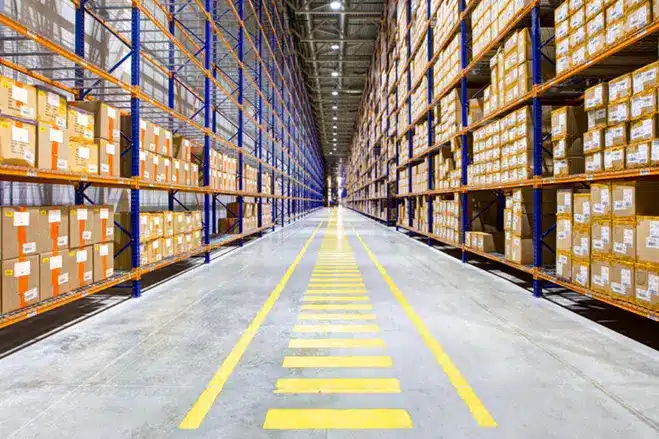
Essential Features to Keep in Mind
To ensure that the warehouse you select will align with the specific needs of your business, there are several things to consider before setting off to actually find warehouse space. Factors such as the intended use of the space, the nature of your products or inventory, the logistical requirements of your operations, and the potential for future growth all contribute to shaping the criteria for an ideal warehouse selection, so here are 6 essential features to keep in mind:
1. Explain Your Business Plan:
Demonstrating a clear and viable business strategy can instill confidence in your business’s future financial success.
2. Eave Heights
The eave height, which refers to the height from the floor to the bottom edge of the roof, plays a significant role in determining the vertical storage capacity and operational flexibility within the warehouse. A sufficient eave height will allow effective utilization of vertical storage space, facilitating the accommodation of tall racks and shelves, and enabling efficient inventory management and organization.
Besides storage, another thing to consider is the type of equipment and machinery your operations require. Machinery such as forklifts and other heavy equipment require sufficient clearance within the warehouse for maneuvering without constraints.
3. Doors
Large and appropriately positioned doors, including overhead doors and dock levelers, are crucial for accommodating the smooth loading and unloading of goods, as well as the convenient access of delivery vehicles and heavy equipment. Evaluating the functionality, size, and durability of the doors is essential in ensuring that they can effectively support the logistical requirements of your operations.
Furthermore, secure and well-maintained doors contribute to the overall safety and security of the warehouse, protecting your inventory and equipment from potential risks and external elements.
4. Space
A spacious layout within the warehouse allows for efficient movement of goods, personnel, and machinery, contributing to streamlined operations and optimized productivity. Columns in the warehouse can limit how you use the space, as they can get in the way of arranging storage or moving equipment, causing potential problems in your operations.
Additionally, ensuring sufficient office space and other auxiliary areas for administrative tasks and business operations is crucial for maintaining a functional and productive workspace.
5. Power
Adequate and reliable power supply is essential for running various equipment, machinery, and technological systems within the warehouse. Assessing the power supply capacity and the availability of essential power outlets is crucial in accommodating the energy requirements of your operational machinery and any specialized equipment, ensuring uninterrupted workflow and preventing potential disruptions that could impact productivity.
Apart from that, adequate and reliable power supply is important for powering heating systems within the warehouse. Evaluating the power supply capacity and ensuring the availability of essential power outlets is crucial for maintaining a comfortable working environment.
Additionally, ensuring sufficient office space and other auxiliary areas for administrative tasks and business operations is crucial for maintaining a functional and productive workspace.
6. Location
Location is one aspect that will significantly impact the overall efficiency and functionality of your business. It’s important to think about how close the warehouse is to your staff and yourself, as well as how easily you can reach it via major highways. Having reliable public transportation nearby can also make it easier for everyone to get to work.
Selecting a warehouse in close proximity to shipping hubs such as post offices can significantly reduce transit times and shipping costs. Being close to shipping facilities can streamline the logistics of sending and receiving packages, enhancing the overall efficiency of your supply chain management.
Finally, the safety and security of the surrounding area is crucial for both the protection of your inventory and the overall well-being and peace of mind of your employees. A secure location can minimize the risks of theft, vandalism, or any potential security breaches, safeguarding your valuable assets and promoting a sense of safety among your workforce.
7. Access
The efficiency with which goods can be transported in and out of the warehouse will significantly impact the productivity and the overall logistics of your business. Whether it’s through ground-level access, truck-level docks, or a combination of both, the accessibility of the warehouse directly influences the speed of loading and unloading processes, the convenience of inventory management, and the overall smooth functioning of your supply chain.
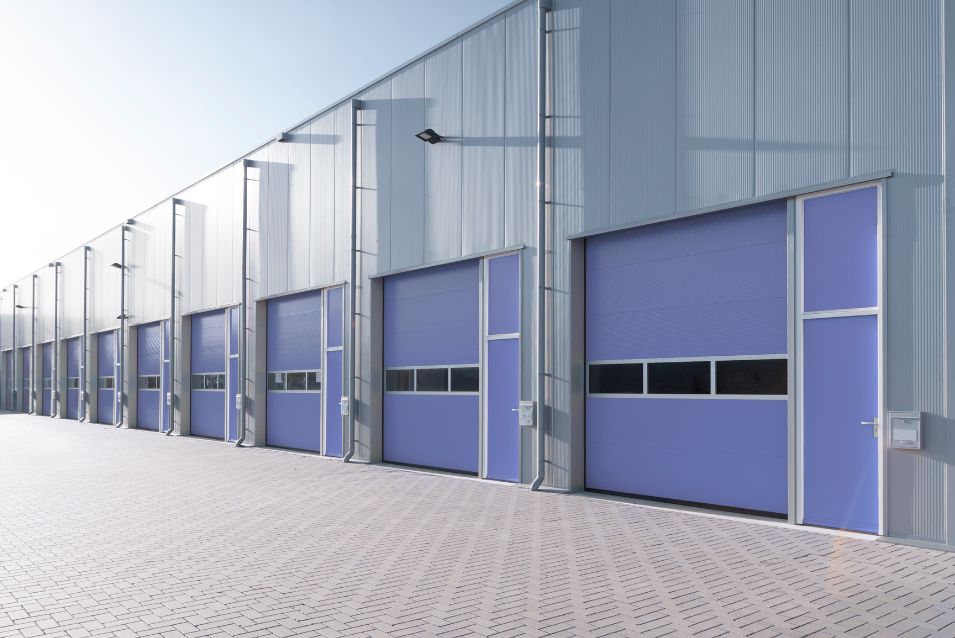
Other Features to Consider
Of course, these six considerations are just the beginning of your journey towards finding the ideal warehouse space for your business. Beyond these fundamental aspects lie many other crucial factors that can significantly impact the overall suitability and functionality of a warehouse.
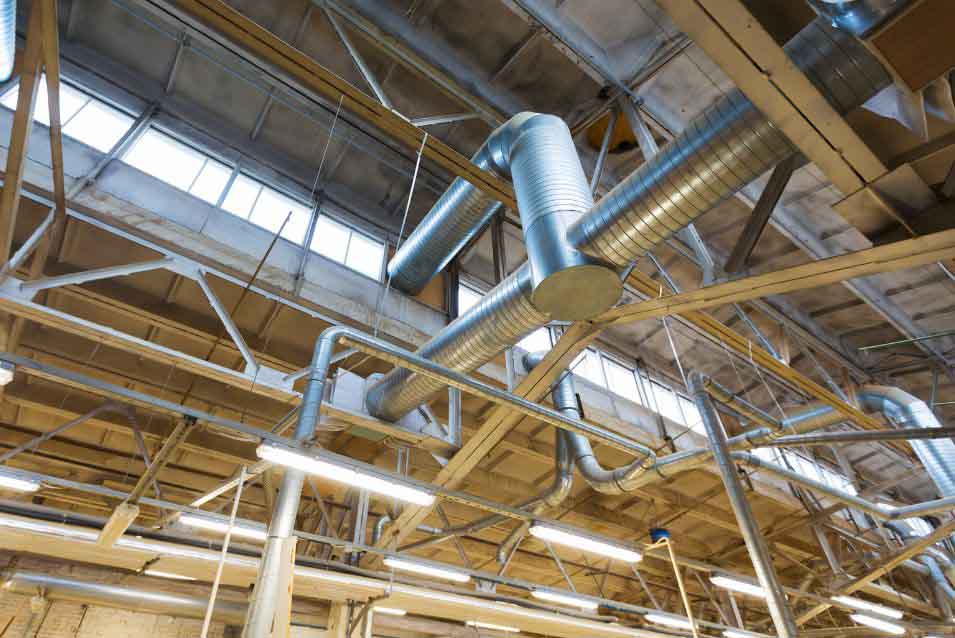
Ventilation
Adequate ventilation systems ensure the circulation of fresh air, preventing the buildup of harmful fumes, odors, or airborne particles that could compromise air quality and pose health risks to employees. Effective ventilation not only fosters a comfortable and conducive working atmosphere but also plays a key role in maintaining the integrity of stored goods and preventing potential damage caused by humidity or excessive moisture.
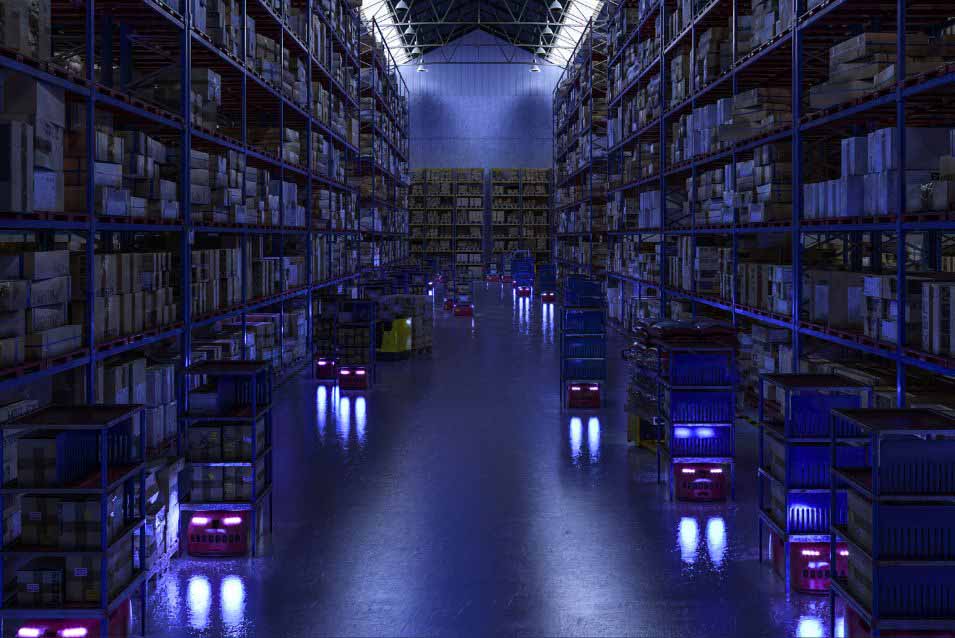
Lighting
Adequate and strategically placed lighting systems are important for maintaining visibility and ensuring a well-lit workspace, enabling employees to carry out their tasks efficiently and accurately. Proper lighting not only enhances the working conditions within the warehouse but also plays a key role in reducing the risks of accidents and errors, thereby contributing to the overall safety and productivity of the facility.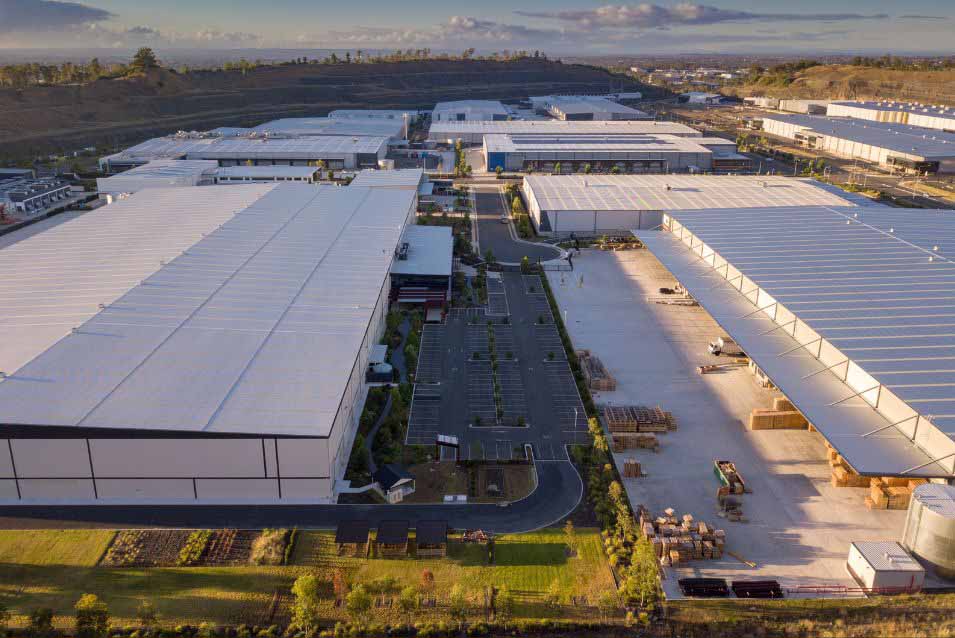
Neighbors
Assessing the potential for disruptive sounds from nearby industrial operations or commercial activities will help ensure a conducive and distraction-free work environment. This consideration is vital for maintaining the focus and productivity of your workforce and minimizing any potential disruptions that could impact the overall efficiency of your warehouse operations.
The combination of these factors, plus the level of competition for space, the economic conditions of the local area, and the dynamics of the market, will collectively determine the financial investment required and the overall cost of the warehouse.

What are CAM Charges?
CAM, or Common Area Maintenance, is going to be a component in your gross rate, and it encompasses the costs associated with the upkeep and management of shared areas within a commercial property. These charges often include the maintenance of common facilities like lobbies, hallways, elevators, and parking lots, ensuring that the property remains in good condition for all tenants. It can also include some utilities, like water, but it is also possible that utilities like heating or garbage aren’t included in CAM.
Make sure you know exactly what is covered in CAM charges before finalizing a warehouse lease. This understanding will help you budget accurately and ensure that the warehouse aligns well with your business needs and financial plans.
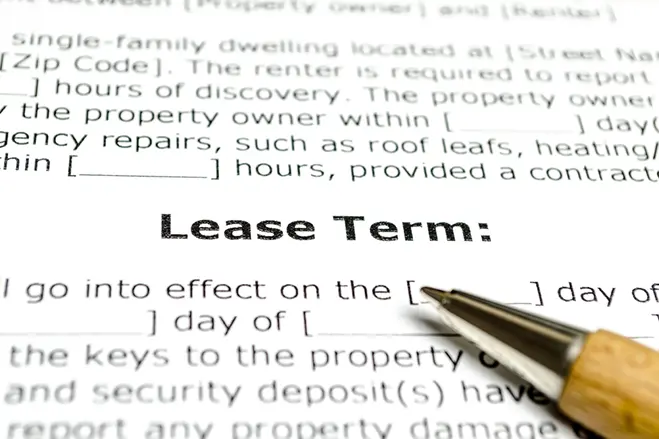
Lease Terms
When considering lease terms for a warehouse, you should try to strike a balance between long-term stability and flexibility. Typically, lease terms are 3 or 5 years, or even longer, but short term leases are common when a space is being sublet. Opting for a shorter lease term, especially when not dealing with a sublease, can be advantageous for your business. It provides you with the flexibility to adapt to potential changes in your business needs and operational requirements.
Considering the unpredictable nature of business growth, understanding the provisions for subleasing within the lease agreement is important. An option to sublease can offer a way to mitigate costs and obligations in case of changes in your business circumstances, allowing for the possibility of subletting a portion of the warehouse to another tenant.

Conclusions
Elite Anywhere can help you navigate all these considerations to find the perfect space for your needs. Whether you are trying to find a warehouse to rent or buy warehouse space, taking these all factors into account can significantly impact the success and functionality of your operations. From assessing credit considerations and the classification of warehouse spaces to evaluating essential features and understanding lease terms, each step contributes to securing a warehouse that aligns with your business goals and fosters optimal efficiency and productivity.
About Us

More than just a white glove delivery company: we specialize in receiving, warehousing, shipping, and national white glove delivery & installation services.
Categories
Related posts


A complete end-to-end logistics company. From receiving to last-mile delivery and everything in between, our staff delivers a true white glove experience with meticulous care and attention to detail. Need something pickup up, crated, and delivered - anywhere in the world? Let's get started!




